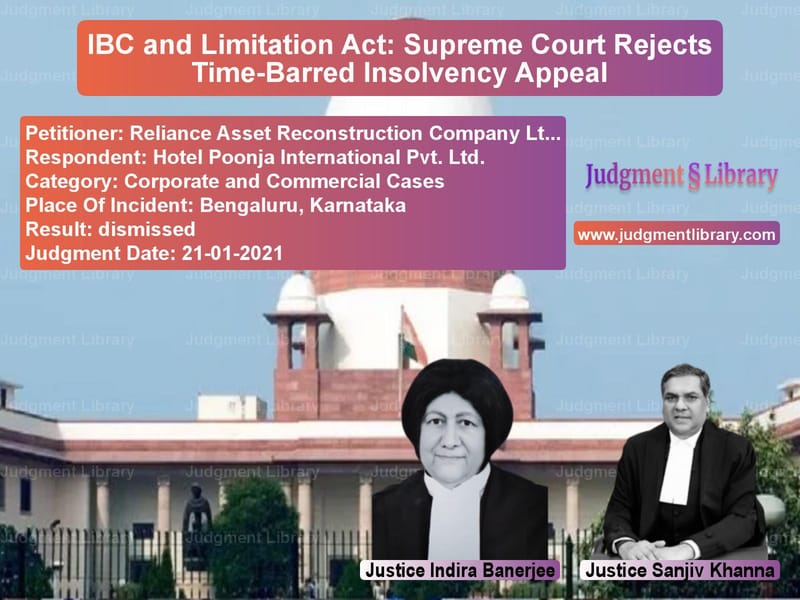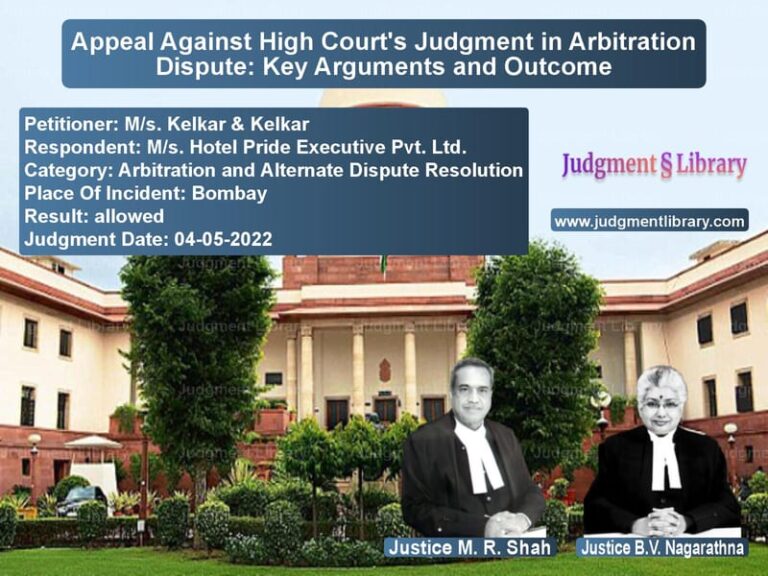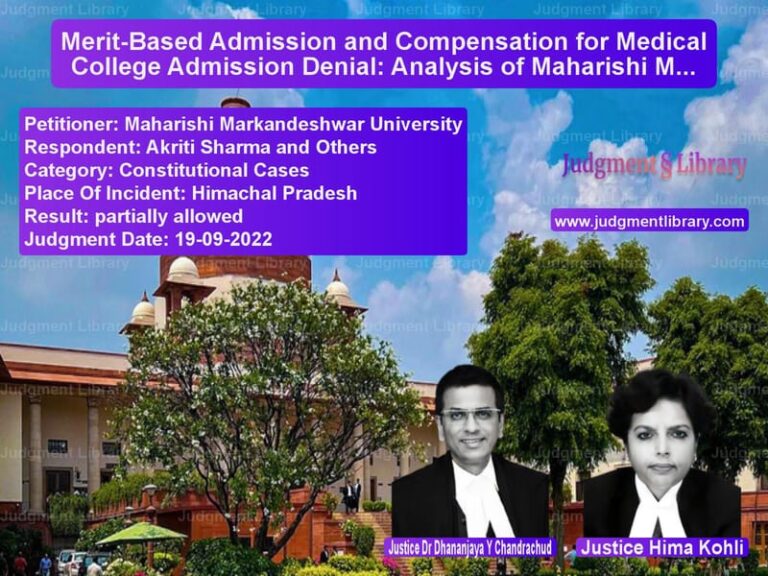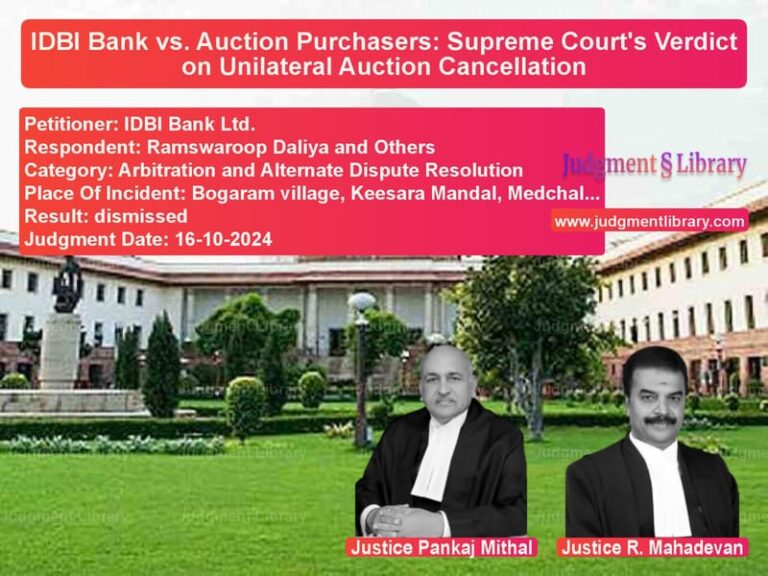IBC and Limitation Act: Supreme Court Rejects Time-Barred Insolvency Appeal
The Supreme Court of India in M/s Reliance Asset Reconstruction Company Ltd. vs. M/s Hotel Poonja International Pvt. Ltd. addressed a crucial question regarding the limitation period for initiating insolvency proceedings under the Insolvency and Bankruptcy Code, 2016 (IBC). The Court upheld the decision of the National Company Law Appellate Tribunal (NCLAT), dismissing the appeal of Reliance Asset Reconstruction Company on the ground of limitation.
The case revolved around whether an application under Section 7 of the IBC, filed decades after the loan account was classified as a Non-Performing Asset (NPA), could be entertained. The Supreme Court ruled that the limitation period for filing such applications is three years from the date of default unless extended by a legally valid acknowledgment of debt under Section 18 of the Limitation Act, 1963.
Background of the Case
The appellant, Reliance Asset Reconstruction Company Ltd., had acquired the loan account of the respondent, M/s Hotel Poonja International Pvt. Ltd., from Vijaya Bank. The loan, originally sanctioned in 1986, was classified as an NPA on April 1, 1993. Subsequently, Vijaya Bank filed an application before the Debt Recovery Tribunal (DRT) in 1998, which resulted in a recovery certificate being issued in 2003.
Read also: https://judgmentlibrary.com/supreme-court-clarifies-contempt-of-court-in-family-business-dispute/
In 2011, Vijaya Bank assigned the debt to Reliance Asset Reconstruction Company. Several years later, in 2018, the appellant filed an application under Section 7 of the IBC before the National Company Law Tribunal (NCLT), Bengaluru, seeking the initiation of Corporate Insolvency Resolution Process (CIRP) against the respondent.
Key Legal Issues Addressed
1. Applicability of the Limitation Act to IBC Proceedings
The Supreme Court reiterated that the Limitation Act, 1963 applies to insolvency proceedings under the IBC. The Court referred to its earlier ruling in B.K. Educational Services Pvt. Ltd. v. Parag Gupta and Associates, where it had held:
“Since the Limitation Act is applicable to applications filed under Sections 7 and 9 of the Code from the inception of the Code, Article 137 of the Limitation Act gets attracted. ‘The right to sue’ accrues when a default occurs. If the default has occurred over three years prior to the date of filing of the application, the application would be barred under Article 137 of the Limitation Act.”
2. Computation of Limitation Period
The Court examined the timeline of events and found that the appellant’s claim was time-barred:
- The loan account was classified as an NPA on April 1, 1993.
- The DRT issued a Recovery Certificate on March 27, 2003.
- The appellant acquired the loan in 2011 but did not file an insolvency petition until 2018.
The Supreme Court held that the limitation period began from the date of default or the last acknowledgment of liability and that an application under Section 7 of the IBC must be filed within three years from that date.
3. Acknowledgment of Debt and Section 18 of the Limitation Act
The appellant argued that the limitation period was extended due to acknowledgments made in the respondent’s financial statements and a settlement offer letter dated April 23, 2019. However, the Court rejected this argument, stating:
“An acknowledgment must indicate a jural relationship of debtor and creditor and should be made before the expiry of the limitation period. The balance sheet and letter in question do not constitute a valid acknowledgment as they do not unequivocally admit liability.”
Findings of the Court
1. IBC is Not a Debt Recovery Mechanism
The Supreme Court reaffirmed its earlier ruling in Mobilox Innovations Pvt. Ltd. v. Kirusa Software Pvt. Ltd. that:
“The IBC is not intended to be a substitute for a debt recovery forum. Whenever there is a real dispute regarding debt, insolvency proceedings cannot be used as a pressure tactic.”
2. Right to Sue Had Expired
The Court held that the right to initiate insolvency proceedings had expired since the limitation period had lapsed long before the application was filed.
3. Availability of Alternative Remedies
The Court noted that the appellant was not left without remedies. The recovery proceedings before the Debt Recovery Tribunal (DRT) were still ongoing, and the appellant could pursue those proceedings instead of invoking the IBC.
Supreme Court’s Verdict
The Supreme Court dismissed the appeal and upheld the decision of the NCLAT, stating:
“There is no infirmity in the judgment and order of the NCLAT. The application under Section 7 of the IBC was barred by limitation and was rightly dismissed.”
The Court also clarified that the appellant could pursue other legal remedies, such as execution of the Recovery Certificate issued by the DRT.
Conclusion
This ruling serves as a significant precedent in insolvency law, reinforcing the principle that IBC cannot be misused as a debt recovery tool. It emphasizes the importance of adhering to the limitation period and highlights that insolvency proceedings are meant for reviving financially distressed companies, not for enforcing time-barred debts.
By upholding the sanctity of limitation laws, the judgment ensures that financial creditors act diligently and do not sleep on their rights. It also safeguards corporate debtors from undue harassment through stale claims.
Petitioner Name: Reliance Asset Reconstruction Company Ltd..Respondent Name: Hotel Poonja International Pvt. Ltd..Judgment By: Justice Indira Banerjee, Justice Sanjiv Khanna.Place Of Incident: Bengaluru, Karnataka.Judgment Date: 21-01-2021.
Don’t miss out on the full details! Download the complete judgment in PDF format below and gain valuable insights instantly!
Download Judgment: reliance-asset-recon-vs-hotel-poonja-interna-supreme-court-of-india-judgment-dated-21-01-2021.pdf
Directly Download Judgment: Directly download this Judgment
See all petitions in Bankruptcy and Insolvency
See all petitions in Corporate Compliance
See all petitions in Judgment by Indira Banerjee
See all petitions in Judgment by Sanjiv Khanna
See all petitions in dismissed
See all petitions in supreme court of India judgments January 2021
See all petitions in 2021 judgments
See all posts in Corporate and Commercial Cases Category
See all allowed petitions in Corporate and Commercial Cases Category
See all Dismissed petitions in Corporate and Commercial Cases Category
See all partially allowed petitions in Corporate and Commercial Cases Category







